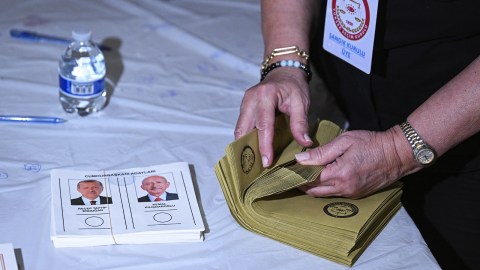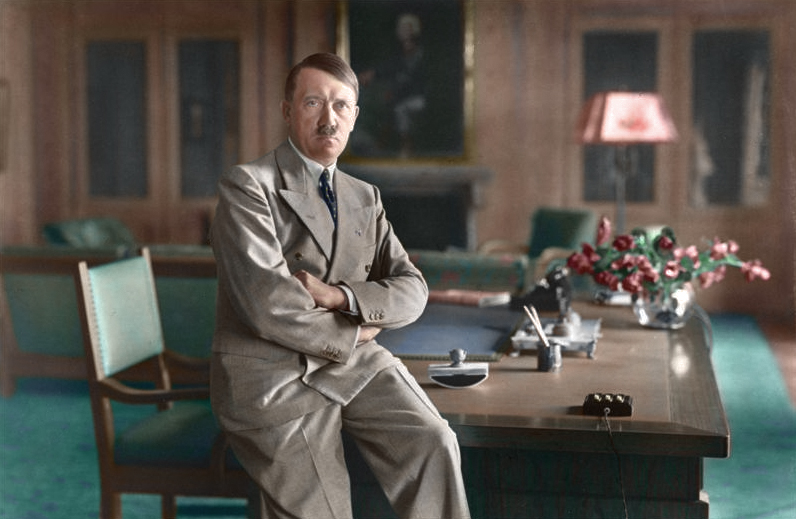Why don’t dictators use realistic fake numbers when rigging election results?

- Historically, autocrats from Syria, Romania, Iraq, North Korea, Russia, and other countries often report extremely high popularity ratings or election results.
- These improbably high figures are often a result of manipulation, with voting circumstances marred by state propaganda, suppressed freedom of speech, and limited voter choices — or outright fabrication.
- The purpose of the pageantry is to add an air of legitimacy to the regime, while trying to stifle criticism. It makes it much harder to challenge a leader who is “democratically elected” and “popular.”
Bashar al-Assad is popular. Perhaps not so much in your household, but if you go to Syria, then he’s very popular indeed. At least, that’s what the polls tell us. In 2021, Assad was re-elected for a fourth term with a whopping 95% of the vote. Well done to Assad for improving on the 89% he got in 2014 with nothing — nothing whatsoever — going on in Syria to dent his popularity. So, are households all over Syria sycophantically pinning up posters of their president? Do families spend entire dinner conversations arguing over Assad’s most admirable virtues?
Probably not. Any remotely independent observer will roll their eyes at these polls. They are the fictional fantasies of a tyrant who cares more about image and power than truth. Elections in totalitarian regimes have nothing to do with free speech, representation, and democratic legitimacy. They are all about rubber stamping an authority that needs to constantly remind itself, and the world, that it ought to be there.
Unrealistic results
The odd thing about faked election data is that most dictators feel the need to invent laughably implausible figures. In 1989, the Romanian dictator Nicolae Ceaușescu claimed that 98.8% of voters had approved of his remaining in power. In 1995 and 2002, Saddam Hussein won his election with 99%. In 2014, 96.77% of Crimea voted to join the Russian Federation. And in 2019, Kim Jong Un of North Korea won 100% of the vote, with a 99.9% turnout. (Presumably the 0.1% were dying, otherwise they would have been at the ballot boxes.) And on it goes.
In all these cases, we’re dealing with the propaganda of state-run institutions. They have simply plucked some numbers from the air and presented them as whatever “truth” means under an Orwellian misery. At other times, as with Assad and Crimea, those allowed to vote, or those who choose to vote, are only ever going to vote one way.
But what about more “plausible” sounding results? For instance, in Russia, Vladimir Putin gets ridiculously high approval ratings — over 70% since 2020 and peaking at 80% in December 2022. These results were even conducted by Levada Centre, a relatively respectable independent polling NGO. The problem, though, is that the first thing any fair poll needs is freedom of speech. And for speech to be truly free, you have to have a second thing: the protection of alternative viewpoints. Neither are available in totalitarian governments like Russia. You vote the way that will keep you and your family safe. The tall poppy gets cut first, so keep your head down, your mouth shut, and nod along to the men holding guns.
Absolute power doesn’t feel so absolute
But why do dictators and autocrats feel the need to hold elections in the first place? Why bother to even pretend to be a democracy and why not embrace their totalitarian heart? It mostly comes down to two things: security and legitimacy.
In their book, The Dictator’s Handbook, Bruce Bueno de Mesquita and Alastair Smith make the point that when you’re at the top of a dog-eat-dog system, you need to spend an inordinate and exhausting effort to keep yourself on top. Dictators need to make the case that everyone around them is replaceable while also taking the contradictory position that they, individually, are irreplaceable. If you can persuade people that between 70% and 99.9% of the population thinks you’re great, then the rivals nipping at your heels can’t get rid of you without risking a civil war.
The other reason for inflated popularity polling is that it gives the dictator leverage, both domestically and internationally. For instance, if anyone suggests regime change in Russia, it suits them well to say, “Putin is the democratically elected and widely liked president.” If Assad brutalizes his people, he can turn around and say, “This is what my people want, so mind your own business.” Dictators are fond of polls. They create the illusion of legitimacy, stability, and popularity.
The principle of bullshit asymmetry
The problem with such obviously faked or manipulated polling data is that it works. Having this data out creates a kind of noise or “data smog” where you start to question everything or accept anything. In an age when people only read the headlines, getting some statistic or “fact” at the top of a page is all that matters.
This (mis)information partly explains the difficulty of debating a regime’s autocratic shill. If you say, for example, that President Maduro is turning Venezuela into a totalitarian regime, a Maduro supporter can reply, “But Venezuela is a democracy — Maduro won 68% of the vote!” Well, yes, he did. But this glosses over the fact that the election was hardly free or fair. The trouble, though, is that this fact-checking analysis is hard to articulate on the spot. Not many people are professors of international relations, capable of dismantling such straight-faced deceit.
This is where Brandolini’s law comes into play. It’s named after the Italian programmer Alberto Brandolini, who stated, “The amount of energy needed to refute bullshit is an order of magnitude bigger than to produce it.” The time, effort, and resources necessary to disprove or dispute something always will outweigh the ease with which anyone can spout whatever nonsense they want. A lie gets halfway around the world before the truth can put its boots on. To question the accuracy and legitimacy of an election or a polling body requires far more background knowledge. It’s why it’s so hard to debate propagandistic media. They say a “fact.” You question its legitimacy. They demand you provide proof where “proof” is intentionally obscured.
“Can you prove to me, right now, that Kim Jong Un didn’t get 100% of the vote? No, so I win.”





